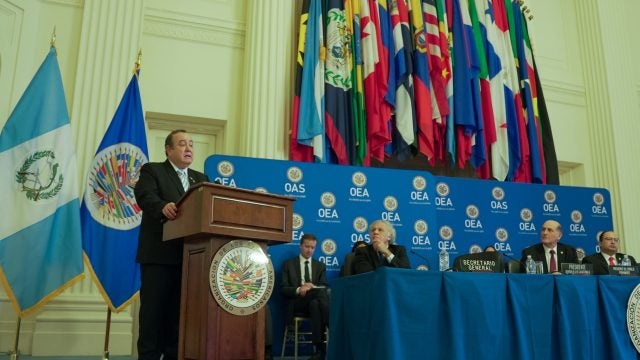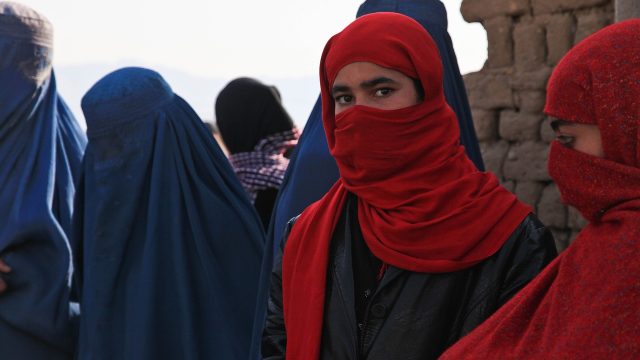Title: Global Leadership on Climate-Linked Human Insecurity: Learning from Pacific Island States
Pacific island states are among the most vulnerable to the crisis of climate change, which threatens massive displacement, tests human rights protection, and imperils territories. These large ocean states, however, are in a unique position to contribute to global efforts. Their work to fill the legal void at the national and regional levels in addressing migration, human rights, and territory loss could shape global governance toward greater responsiveness, innovation, and integration.
Change and challenge have defined the year 2020. The global pandemic has claimed over a million lives and threatens livelihoods around the globe, the climate crisis persists unabated, and systemic inequity demands urgent response at all levels of governance. Global challenges transcend national borders, require systemic changes, and clearly show that “as a society, we’re only as safe as our most vulnerable people,” as Christiana Figueres, chief architect of the Paris Climate Agreement, wrote in March 2020. Globally, the Pacific island states are some of the smallest and most vulnerable to the climate crisis, which threatens massive displacement, tests human rights protection, and imperils territories. But their vulnerability has placed them in the unique position to lead the effort in tackling these issues. Their work to fill the legal void at the national and regional levels in addressing migration, human rights, and territory loss offers important lessons for global governance.
Pacific island states are uniquely vulnerable to the effects of the unfolding climate crisis, which is the “single greatest threat” to human security in the region. The ocean comprises over ninety-eight percent of the territory of these “small island” or “great ocean” states, so impacts on the ocean immediately affect these sovereign states and the people that inhabit them. “Our coral reefs are dying, our food is disappearing, and we fear for the safety of our loved ones,” Pacific leaders proclaimed to the global community during UN Secretary-General António Guterres’s visit to Fiji and Tuvalu in 2019.
Mobility and migration—“routes and roots”—have long been a fact of life in the Pacific and a source of socioeconomic opportunity. Sea level rise, however, will drive unprecedented and unpredictable mass displacement within and across borders in the region. People displaced in the context of disasters due to the effects of the climate crisis will need protection, international attention, and humanitarian action. Several high-profile Pacific cases, campaigns, and statements have garnered significant media attention and helped drive the global discourse on climate-linked human insecurity.
In 2014, the President of Kiribati, Anote Tong, made headlines worldwide when he pioneered the purchase of a plot of land in Fiji to ensure food security. Fiji’s prime minister, Frank Bainimarama, has noted multiple times that he would welcome climate refugees from Tuvalu and Kiribati, despite the lack of legal precedent or enforcement options in the event of a change in leadership. In 2016, Kiribati’s Ioane Teitiota took a climate refugee case to the UN Human Rights Committee (HRC) after New Zealand authorities denied his claim of asylum. The 2020 HRC decision recognized that climate change represented a serious threat to the right to life, prompting Amnesty International to comment that “Pacific island states do not need to be under water before triggering human rights obligations.” And in 2019, Pacific law students mounted a high profile campaign, favorably recognized by Pacific leaders, for the International Court of Justice to write an opinion on the human rights aspects of climate change.
Pacific island populations are familiar with “imagining” a course that recognizes human mobility as one tool to promote “adaptation and development among Pacific people in a changing climate.” But traditional legal frameworks for migration within and across borders do not and cannot account for climate-driven migration as there is no international obligation for countries to take people displaced by climate change into their territory. There is also no right to funding from the international community for relocation and no precedent for resolving issues regarding the legal status of nations and citizens where territory has been fully lost or become uninhabitable.
Climate change, moreover, will likely cause the movement not only of people but also of borders, which could threaten the very existence of some states. As maritime “baselines” used to mark marine territory are inundated, vast swaths of this territory will be thrown into legal limbo and with it the security of Pacific islands. Their leaders and people are therefore pushing the international legal system to grapple with issues of human rights and sovereignty stemming from the climate crisis.
Beyond efforts to spur global action, Pacific island states have adopted a number of practical policy responses at home, especially in regard to issues of security and sovereignty. Tuvalu has amended legislation to show that the breadth of its maritime zones is measured from an unchanging, fixed baseline. The Republic of the Marshall Islands has amended its submission of maritime boundaries to the UN to reflect a similar policy. Kiribati developed a cross-border labor migration scheme as part of its Migration with Dignity Policy as one adaptive mechanism to mitigate the human security risks from climate change.
In particular, Fiji’s government has given serious thought to internal migration prompted by climate change since the first relocation of an entire village in 2014 and has maintained an active and consistent policy response since then. Fiji passed a Climate Relocation of Communities Trust Fund Act in 2019, which established an adaptation trust fund for the planned relocation of the country’s impacted communities. The country has also socialized a draft climate change bill, which introduces innovative climate litigation, adaptation, and resilience measures; considers principles related to climate displacement for at-risk communities; and provides the possibility of introducing regulations to facilitate the acceptance of persons from small island developing states in the Pacific who have been (or may be) permanently displaced as a result of climate change impacts.
Acting regionally through organizations like the Pacific Islands Forum (PIF) and the Pacific Community (SPC), Pacific nations are working hard to reduce the humanitarian and legal risks stemming from climate change. The 2018 Boe Declaration put climate change at the forefront of collective security action, noting that “climate change remains the single greatest threat to the livelihoods, security, and wellbeing of the peoples of the Pacific.” Pacific leaders have stressed the urgency of delineating their maritime boundaries and committing to a collective effort, including the development of international law to protect the integrity of maritime zones threatened by sea-level rise.
These Pacific responses contain lessons for building more comprehensive, global solutions. First, Pacific island states have been active in requesting the International Law Commission (ILC), an expert group at the United Nations with a mandate to aid in the development and codification of international law, to study the question of how sea-level rise may affect territorial baselines. In response, the ILC has not only commenced this program of work but has cited Pacific frameworks as state practice that may provide the foundation for newly recognized international law.
Second, the Pacific island states have been active in driving global conversations on climate change-driven migration. Several Pacific interventions urged UN member states to recognize climate change as a root cause of migration during negotiations over The Global Compact on Safe, Orderly and Regular Migration. The final compact includes language to this effect—a necessary, though incomplete, step towards global action.
Third, many of the strategies employed by Pacific leaders and negotiators combine attention-grabbing rhetoric with pragmatic proposals for solutions. Pacific island states have worked to integrate climate change into their National Sustainable Development Plans and strategies for disaster management and often govern these issues within the same ministry. Crafting integrated policy frameworks that encompass action on climate change, disaster risk, migration, and development will be necessary at the national and global scale to tackle the complex interrelated issues of climate-linked human insecurity. If other states could craft similarly integrated and cross-sectoral plans to fully account for climate change, transformation in global policy and practice would be possible.
. . .
Maria Ivanova is Associate Professor of Global Governance and Director of the Center for Governance and Sustainability at the University of Massachusetts Boston. She served on the UN Scientific Advisory Board to Secretary-General Ban Ki-moon. Her book, The Untold Story of the World’s Leading Environmental Institution: UNEP at Fifty, is forthcoming in February 2021.
Stephanie Reed has expertise in environment and development and has worked on these issues in Africa, South Asia, and the Pacific. She is currently a Foreign Service Officer. The views expressed in this article are solely those of the author and do not represent the views of the U.S. Department of State or the U.S. Government.
Daniel Zaleznik spent four years as an adviser supporting the activities of Pacific Island state Missions at the United Nations in New York. He is currently finishing his J.D. at Harvard Law School with a focus on international law.
Recommended Articles

For many in the Global South, the ‘American Peace’ or Pax Americana is a mirage amid a world of war, economic hardship, forced migration, environmental calamity, and political repression while…

The United Nations is scheduled to host its third meeting of international envoys to Afghanistan in Doha on June 30, 2024. This meeting aims to discuss and address significant…

Qatar plays a crucial role in mediating conflicts in the Middle East region. Its engagement in negotiations with diverse stakeholders–including countries like Lebanon, Sudan, and Libya and non-state actors such…